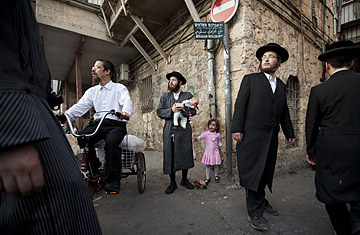
Ultra Orthodox Jews attend the funeral of Rabbi Yosef Shalom Elyashiv in Jerusalem, Wednesday, July 18, 2012. Elyashiv, revered by Jews worldwide as the top rabbinic authority of this generation for his scholarship and rulings on complex elements of Jewish law, died Wednesday, hospital officials said. He was 102.
Elhanan Gibli found God. not just in the personal-salvation sense. There was an address.
God was last known to reside approximately 300 yards north of the minimart at the corner of Ma'ale HaShalom and Wadi Hilwa. There stood the Second Temple, built around the Ark of the Covenant containing the Holy of Holies. And two millennia after the temple's destruction, the power of the divine still radiated so potently from the remaining stones that Gibli recalls feeling it in his entire being the first time he entered Jerusalem's Old City, at age 13. The welling of awe affirmed a pair of decisions: One was to live his life as his parents had, wholly within a very conservative strain of Judaism known as ultra-Orthodox. The other was to live that life in Jerusalem. Both would play hell with the local real estate market.
Millions visit the Holy City each year. Most are pilgrims to the signal sites of Christianity, though Muslims gather at their own great shrine above the Western Wall. Neither, however, are terribly welcome as residents. Since 1967, Jerusalem has become a resolutely Jewish city, so much so that the central question preoccupying residents today is not how it might be divided with Palestinians--for they are widely ignored of late--but rather just how religiously conservative the city can become while remaining a place most Israeli Jews could imagine living.
Forty-five years after the last decisive contest for the city--the lightning push by Israeli forces who needed just two days of the Six-Day War to take the whole place--a new battle for Jerusalem is under way. This contest is a grinding war of attrition, fought from trench lines etched across leafy neighborhoods of a city divided between Jews like Gibli, who wear black fedoras and sit primly away from women on public buses, and Jews like Noam Pinchasi, who keeps a glossy of Marilyn Monroe next to the fridge.
Both men own apartments in a neighborhood called Kiryat Yovel, a seemingly serene urban glade that is sizing up as the Somme or perhaps Little Big Horn. In a city of almost 800,000 people, Kiryat Yovel may be the last stand for Jews like Pinchasi, seculars who for decades have been fleeing the city in droves. Some 20,000 have left in the past seven years alone, reducing the share of the population who wear their faith lightly from a 37% plurality to a 31% minority, the same percentage as the ultra-Orthodox, but the number of ultra-Orthodox is rising. (About 35% of Jerusalem is Muslim Palestinian, with the remainder Christian or undeclared.)
